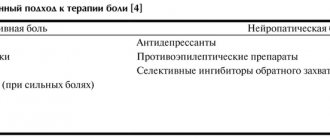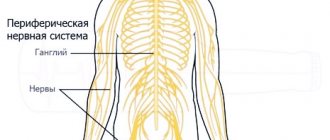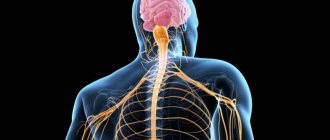Updated: 06/22/2021 The intense rhythm of life, stressful situations, increased physical or mental stress that we encounter almost every day ultimately lead to unstable functioning of the nervous system, which causes chronic fatigue, sleep disturbances, irritability, and memory loss. and other not very pleasant symptoms. Specially developed medications will help cope with these problems and even prevent their occurrence.
Of course, you can start leading an active lifestyle, eliminate bad habits, and balance your diet, but the human body cannot produce some substances for the stable functioning of the nervous system on its own. In this case, you simply cannot do without taking dietary supplements and vitamins.
Let's consider the main components of industrially produced drugs to normalize the functioning of the central nervous system. B vitamins are involved in many reactions necessary for the normal functioning of nerve cells.
- Vitamin B1.
It is not synthesized in the body, the only source is the food we eat. The substance is necessary for converting energy from food into energy substrates for cells. This vitamin is closely related to magnesium metabolism; deficiency leads to the death of neurons in the part of the brain that is responsible for memory function. - Vitamin B3.
Helps release energy from carbohydrates. With its deficiency, symptoms such as insomnia, stress, anxiety, depression, and muscle weakness appear. - Vitamin B4.
Stabilizes the functioning of the nervous system, stabilizes the restoration of nerve cells, stimulates the heart and improves blood supply to the brain. - Vitamin B5.
Plays an important role in the production of energy from fats and carbohydrates. A deficiency of the substance can lead to serious consequences for human health: memory, energy and resistance to stress decrease, and irritability appears. - Vitamin B6.
Necessary for the production of serotonin (“the hormone of happiness”) and maintaining stable functioning of the central nervous system. Deficiency can lead to a risk of Alzheimer's disease. - Vitamin B9 (folic acid).
Participates in the process of cell division and promotes fiber growth. The lack of this element leads to memory impairment. - Vitamin B12.
Has a positive effect on brain function and improves mood. - Vitamin C.
Not produced in the body. With its deficiency, memory and mental abilities decrease. - Vitamin D.
When it is deficient, symptoms of stress such as irritability and nervousness appear. The human body is able to independently synthesize this substance only with a sufficient amount of sunlight. - Vitamin E.
Helps relieve fatigue and irritation, has a calming effect.
In addition to vitamins, products for stabilizing the functioning of the nervous system contain micronutrients, minerals and auxiliary substances.
We present the rating of vitamins for the nervous system 2021. The best 12 products that were selected by our experts based on user reviews and ratings.
There are contraindications, be sure to consult your doctor!
| Rating (2021) | Prices, ₽ | A country |
| 1. Solgar magnesium citrate | from 900₽ | USA |
| 2. Doppelhertz Active Antistress | from 380₽ | Germany |
| 3. Orthomol Vital m | from 5000₽ | Germany |
| 4. Complivit Antistress | from 250₽ | Russia |
| 5. Berocca Plus | from 900₽ | France |
| 6. Milgamma compositum | from 660₽ | Germany |
| 7. Doppelhertz active glycine + b vitamins | from 230₽ | Germany |
| 8. Blagomax complex of vitamins in capsules | from 260₽ | Russia |
| 9. Magnesium B6 Evalar | from 280₽ | Russia |
| 10. Angiovitis | from 180₽ | Russia |
| 11. Glycine Forte Evalar | from 160₽ | Russia |
| 12. Multi B-complex Vitamir | from 130₽ | Russia |
Vitamins in complex therapy of neuropathies
The International Statistical Classification of Diseases (ICD-10) contains a huge section (G 50–64), which includes the whole variety of clinical variants of neuropathies: from damage to individual nerves, roots and plexuses to systemic polyneuropathies. Damage to peripheral nerves can be caused by metabolic disorders, ischemia, blood diseases, intoxications, nutritional factors, injuries, allergic reactions, inflammatory processes and other reasons. The pathology of formations of the peripheral nervous system acts as an independent disease or clinical syndrome and is so often encountered in the practice of a doctor that not a single specialist, either therapeutic or surgical, can ignore this problem. The peripheral nervous system includes the dorsal and anterior roots of the spinal cord, intervertebral spinal ganglia, spinal nerves, their plexuses, peripheral nerves, as well as the roots and ganglia of cranial nerves and cranial nerves. The formation of a peripheral nerve occurs as follows. Following to the periphery from the spinal cord (or from the cranial cavity), spinal nerves (or cranial nerves), consisting of portions of motor, sensory fibers, form a peripheral nerve. Peripheral nerves are mostly mixed and consist of motor fibers of the anterior roots (axons of the cells of the anterior horns), sensory fibers (dendrites of the cells of the intervertebral nodes) and vasomotor-secretory-trophic fibers (sympathetic and parasympathetic) from the corresponding cells of the gray matter of the lateral horns of the spinal cord and ganglia of the sympathetic border trunk. The nerve fiber that is part of the peripheral nerve consists of an axial cylinder located in the center of the fiber, a myelin sheath covering the axial cylinder and a Schwann sheath (Fig. 1). Large nerve trunks consist of 800 thousand - 1 million nerve fibers, which provide a significant functional safety margin of the peripheral nervous system. It is believed that the function of the nerve trunk is impaired only if half of the nerve fibers die. The myelin sheath of the nerve fiber is interrupted in places, forming the so-called nodes of Ranvier. For many years it was believed that the myelin sheath plays the role of an electrical insulator in the process of conducting excitation along a nerve fiber. However, the role of the myelin sheath is probably more significant - it is directly involved in the formation of the electrical potential of the nerve fiber. Undoubtedly, its participation in the metabolic processes of the nerve cell is extremely high - the function of the nerve fiber is disrupted when the myelin sheath is damaged. The connective tissue in peripheral nerves is represented by membranes covering the nerve trunk (epineurium), its individual bundles (perineurium) and nerve fibers (endoneurium). The membranes contain vessels that supply the nerve. The myelin sheath makes up the bulk of the peripheral nerve. Myelin is a substance consisting of cholesterol, phospholipids and proteins - the result of folate-dependent synthesis, which occurs with the direct participation of the enzyme methylenetetrahydrofolate reductase (MTHFR) and coenzymes (folic acid and B vitamins). The myelin sheath is the most vulnerable part of the peripheral nerve. It suffers as a result of destruction (toxic, immune mechanisms) or insufficient synthesis of myelin components (metabolic disorders, lack of vitamins). In any case, the synthesis of myelin requires significant stress on numerous enzyme systems, since the total mass of this substance in the body exceeds 200 g. Clinical syndrome of peripheral nerve damage is most often associated with segmental demyelination of nerve fibers. Segmental demyelination (myelinopathy) means damage to the myelin sheaths while the axons are intact. The most significant functional manifestation of demyelination is conduction blockade. Functional failure in a blocked axon is the same as when the axon is crossed. Despite the fact that nerve transection and conduction blockade during demyelination show similarities in the severity of development of motor and sensory disorders, there are differences between them. Thus, in demyelinating neuropathies, conduction blockade is often transient and remyelination can occur quickly, within days or weeks, often ending in recovery [4]. Thus, with this process, the prognosis is more favorable and recovery is faster than the course. The most important clinical sign of segmental demyelination is a dysfunction of the distal-peripheral type: the greater the length of the peripheral nerve, the more noticeable conduction disturbances become. First of all, this is manifested by sensitivity disorders in the distal parts of the limbs. Vitamin B6 - pyridoxine is a coenzyme of more than 100 enzymes, takes part in the synthesis of neurotransmitters (tryptophan, glycine, serotonin, dopamine, norepinephrine, adrenaline, histamine). It reduces cholesterol and homocysteine levels in the blood. Vitamin B6 controls erythropoiesis and is involved in the formation of the immune response. There is a convincing correlation between a decrease in the level of pyridoxine in the blood and the clinical manifestations of polyneuropathies. Magnesium is one of the important biogenic elements, which is a cofactor in many enzymatic reactions. Plays an important role in the activity of the nervous system, participates in the regulation of the transmission of nerve impulses and in muscle contraction, in most metabolic reactions, promotes the production and consumption of energy, and plays an important physiological role in maintaining ion balance. Magnesium is involved in the synthesis of all currently known neuropeptides in the brain and is responsible for transmitting inhibitory signals from the center (head) to peripheral nerves and muscles. Magnesium is an anti-stress macronutrient that has a normalizing effect on the state of the nervous system and its higher parts (especially in combination with vitamin B6 - pyridoxine) in cases of nervous tension, depression, and neuroses. It nourishes nerve cells, prevents depression and reduces the effects of stress, reduces fatigue, irritability, and normalizes sleep. B vitamins and magnesium are central to the treatment of diseases of the peripheral nervous system. Among the numerous diseases of the nervous system, the most significant indications are for vitamin preparations and magnesium for polyneuropathies of various origins [1–2]. Although the etiology of polyneuropathies is extremely diverse, a lack of B vitamins and magnesium unites most clinical variants of this neurological syndrome. According to the literature, polyneuropathies arising as a result of complications of diabetes mellitus or alcohol intoxication account for more than two-thirds of all cases of polyneuropathies [1]. In addition to reducing the manifestations of sensitivity disorders, vitamins and magnesium in polyneuropathy have a significant effect on the manifestations of vegetative-trophic disorders in the neuropathic form of diabetic foot syndrome. Systemic metabolic disorders associated with obesity have attracted increasing attention from doctors in recent years. Surgical treatment of morbid obesity is becoming an increasingly common practice. Surgical reconstruction of the gastrointestinal tract often saves patients from a number of fatal complications. However, subsequently, as a result of disruption of the process of assimilation of biologically important substances, patients often suffer from disorders of the peripheral nervous system. Patients after surgery for morbid obesity require compensatory treatment with the mandatory inclusion of B vitamins and magnesium during the entire rehabilitation period. The main purpose of prescribing vitamin preparations, magnesium in this case is the prevention of dysmetabolic polyneuropathies. Acute inflammatory demyelinating polyneuropathies require parenteral administration of B vitamins in both the acute and recovery periods. At the same time, to activate myelin synthesis, a combination of B vitamins with folic acid is necessary [3]. Radiculopathy associated with vertebrogenic factors requires relatively short courses of vitamin therapy. After eliminating the causes of root compression, B vitamins are prescribed for 2–3 weeks, which significantly speeds up the rehabilitation process. Thus, treatment with combination drugs in the complex therapy of diseases of the peripheral nervous system not only has not lost its significance, but has received a deeper justification. The use of a combination drug should be considered an absolute indication in all cases of damage to the nervous system, which are based on the processes of demyelination or impaired remyelination. Modern correction of myelinopathies, as systemic metabolic disorders, is impossible without timely and adequate treatment with drugs containing pyridoxine and magnesium. For diseases that occur with disturbances in carbohydrate, fat and protein metabolism (diabetes mellitus), systematic treatment with combination drugs is necessary to activate metabolic processes and restore the processes of synthesis of protein compounds. Preparations containing vitamins and magnesium are absolutely necessary for patients suffering from malabsorption of essential coenzymes (alcoholism, patients who have undergone complex reconstructive operations on the gastrointestinal tract).
Literature 1. Anisimova E.I. The effectiveness of benfotiamine in the treatment of alcoholic polyneuropathy. Journal of Neurology and Psychiatry named after. S.S. Korsakov. 2001. T 12. No. 101. P. 32–36. 2. Zinovieva O.E. Alpha-lipoic acid preparations in the treatment of diabetic polyneuropathy. Neurology, psychiatry, neurosomatics. 2009. No. 1. P. 58 – 62. 3. Guidelines for the diagnosis and treatment of neuropathic pain. Edited by N.N. Yakhno. Moscow, RAMS publishing house, 2008. 32 p. 4. Mooney S., Leudorf JE Vitamin B6: a long known compound of surprising complexity. Molecules. 2009. T.14. p. 329 – 51.
Neuroprotective effect of vitamin D
Very often, a vitamin complex for stress contains a “sunshine” vitamin. Surprised? Why then in winter, when the rays of the sun appear only occasionally, does melancholy attack? Scientists have found two explanations for the tonic effect of this compound.
First, vitamins for the nervous system inhibit the action of the enzyme responsible for the metabolism of glutathione, which, in turn, protects the brain from damage by neurotoxic agents that provoke the development of ischemia.
Secondly, calciferol “fixes” calcium, which has a beneficial effect not only on bones, but also on neurons.
IMPORTANT! Food contains very little vitamin D, so to ensure its proper level in the body you need to take vitamin complexes.
Why does the body need B vitamins?
Our central nervous system, and especially its leader, the brain, simply requires sufficiently large amounts of energy for productive work.
B vitamins are involved in the synthesis of energy for the central nervous system. They are also noticed in close connections with the circulatory and cardiovascular system; without them, it also begins to “slow down”. Of course, not all B vitamins immediately perform the designated roles; each vitamin has its own “role,” and we will also talk about this in detail. But how do you know if you are lacking B vitamins?
You may notice a lack of energy, irritability, a tendency to tantrums, a basic decrease in mood, and even suspect that you are depressed. If the cause is B deficiency, the symptoms will most likely be supplemented by insomnia and loss of “former beauty” (brittle hair and nails, deterioration of skin quality).
Vitamins for hair and central nervous system group B
Thiamine is involved in the metabolism of carbohydrates and, by providing nerve cells with the daily norm of glucose, protects them from the growth and thinning of the protective layer. In addition, it is responsible for the metabolism of neurotransmitters (acetylcholine and serotonin) and prevents brain cells from aging (by the way, the content of vitamin B1 in the blood of patients with senile dementia is extremely low). The main sources of this vitamin of optimism are cereals (oatmeal, buckwheat and millet) - not the most delicious foods in the world. The taste of vitamins for the nervous system is sweet and pleasant.
Pyridoxine is not only a lever for triggering the secretion of serotonin for “twitchy” people suffering from chronic fatigue and excessive sleepiness, but also one of the main vitamins for hair, ensuring growth, shine and endurance of the hair. The substance is found in pork, white bread and sunflower seeds - high-calorie foods and harmful to athletes. The best option in this case is a dietary supplement.
Cobalamin improves cognitive function and, by reducing the concentration of homocysteine in the blood, minimizes the risk of stroke. But protecting the brain from toxins is a difficult and therefore expensive task. Some types of fish (halibut, tuna), other seafood (oysters, crabs, shellfish) and... sports nutrition from leading manufacturers GNC, My Protein, Optimum Nutrition, Biotech, etc. are rich in such vitamins.
Vitamins to counteract stress
Most often, people lack the substances listed above, but various vitamins. In this case, the normal functioning of the nervous system is sometimes seriously disrupted. The following vitamins are most important for its functioning and proper functioning of the brain:
- Vitamin A: it promotes reliable protection of body cells from free radicals, counteracts early wilting, and helps regulate sleep. If the body does not have enough of this vitamin, then insufficient reaction speed, fatigue, and tiredness may occur. There is a lot of this vitamin in eggs, fish liver, animal oil, carrots, and apricots. It is recommended to consume raw fruits and vegetables to obtain it. They need to be consumed raw, since their processing can destroy more than half of all vitamins beneficial to the body.
- B1: this vitamin can strengthen the nerves and calm a person. In addition, it also has a calming effect and has a good effect on intellectual activity. If this vitamin is not enough in the body, memory may deteriorate, anxiety may appear, and sometimes problems with falling asleep may occur. Quite a lot of this vitamin is found in meat, fish, raw nuts, peas, cabbage, cereals, and dairy products.
- Q2: It is involved in the synthesis of new neurons. If there is little of it in the body, symptoms such as weakness, irritability, and fatigue are often observed. In addition, mood may be unstable. There is a lot of this vitamin in meat, nuts, sour cream and other dairy products.
- B3 (PP): it helps improve blood circulation in the brain, helps restore energy in cells. With a small amount of it, memory loss may occur and a feeling of fatigue may appear. It is easy to get B3 from milk and various products made from it, from chicken, nuts, mushrooms, and beans.
- B6: It is involved in the synthesis of serotonin, which improves mood, helps increase activity during the day and improves sleep at night. In case of B6 deficiency, memory and sleep disorders are often observed. And you can get it from pomegranates, nuts, garlic, cereals, and sea fish.
- Q9: If there is a small amount of it in the body, a person may develop anxiety, fears over trifles, memory often decreases, and other problems in the functioning of the psyche may arise. To compensate for the deficiency of B9, you need to eat more cabbage (including cauliflower), carrots, and yeast.
- B11: helps strengthen the nervous system and even in case of problems with it restore its condition, improves the body's resistance, promotes normal functioning of the heart and brain. If there is a lack of it in the body, there may be a deterioration in brain activity, and sometimes a feeling of anxiety appears. There is a lot of vitamin in meat, milk, cereals, fish.
- B12: it takes an active part in ensuring reliable protection of the body from all kinds of adverse external influences, allows you to restore cells, and improve sleep. If the body lacks at least a little of this vitamin, sleep disorders may occur, memory sometimes deteriorates, and previously unusual irritability appears. A lot of B12 is found in sea fish, meat, dairy products, and chicken eggs.
- Vitamin C helps maintain immunity at the proper level and improves the functioning of the brain and nervous system as a whole. Among other things, this vitamin allows you to cope with nervous stress and frequent stress. In case of low intake of this vitamin from food, mood may worsen, and nervous breakdowns may occur. There is a lot of ascorbic acid in lemons and other citrus fruits, black currants, meat and dairy products, parsley and some other herbs.
- Vitamin D: its sufficient quantity helps prevent oxygen starvation, it also allows you to overcome stress. If there is not enough vitamin, a person may become nervous, have memory disorders, and sometimes insomnia. There is a lot of vitamin D in fish oil, animal oil, eggs, and cottage cheese. In addition, to obtain it, it is recommended to walk in the sun more often.
- E: helps strengthen blood vessels, helps protect the body from free radicals. In case of its deficiency, mood, memory and attention are disturbed, the person becomes irritable. There is a lot of vitamin in vegetable oil, as well as in nuts, green and onions, and greens like spinach.











